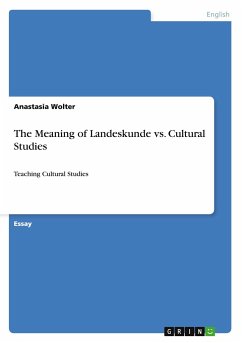Research Paper (undergraduate) from the year 2010 in the subject Didactics - English - Applied Geography, grade: 2, University of Education Heidelberg, language: English, abstract: A large number of people believe that everything that is man - made can be seen as culture.Moran leaves no doubt about those products' importance, when he writes: "Products, thevisible dimension of culture, are the gateway to the new culture, the new way of life" (p. 48).But are there only architecture, paintings, literature, music, language, and food which come tomind if we think of a country's culture? The iceberg model shows that these aspects representonly a small amount of culture that, just like the visible section of an iceberg above thewaterline, can be seen easily and understood clearly. However, there are a lot more facets,also like an iceberg, that can only be suspected or imagined. These parts of the iceberg are itsfoundation and the iceberg model makes clear that it is impossible to understand people fromdifferent cultural backgrounds, unless we are able to appreciate what the foundations of theirculture are. But no matter how many different definitions of the term "culture" exist, a lot ofthem cover problems concerning the human beings and their life in a community. This impliesthat we can't learn about another country's culture by reading a lot of books about it, but weneed the encounter with another way of life. In that way, culture can also be seen as a conceptwhich regulates the interpersonal cohabitation of human beings in a collective. This collectivedoes not have to be a country by all means, but can also be a group of people with the sameinterests. If some people who are fond of a special musical genre such as goth, pool together,they have their own culture, too and it is not necessary that they live in the same country. Butit is not merely the music that connects them, but rather "shared interpretations about beliefs,values, and norms, which affect the behaviors" (Lustig, Koester, 2003, p. 27) and influencethe way their thinking is organized. [...]








